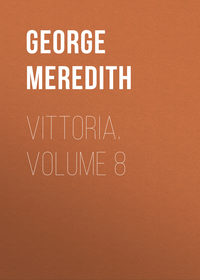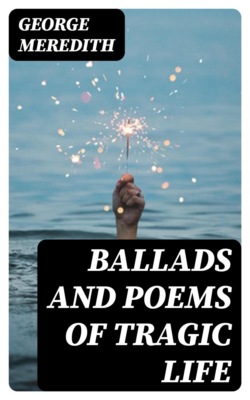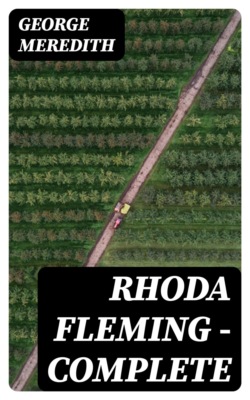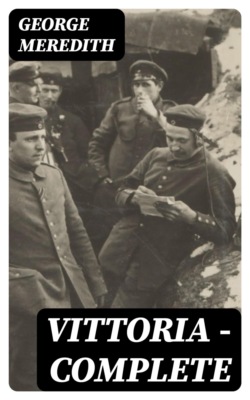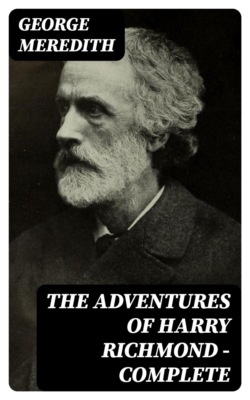Kitabı oku: «Vittoria. Volume 8», sayfa 6
"Ah; you mean that you have nothing to learn." Anna shuddered.
"I mean that you are likely to run into the other extreme of disfavouring yourself just now, my child. And," continued the duchess, "you have behaved so splendidly that I won't think ill of you."
Before the day darkened, Wilfrid obtained, through Prince Radocky's influence, an order addressed to Major Nagen for the surrender of prisoners into his hands. He and Count Karl started for the Val Camonica on the chance of intercepting the pursuit. These were not much wiser than their guesses and their apprehensions made them; but Weisspriess started on the like errand after an interview with Anna, and he had drawn sufficient intelligence out of sobs, and broken sentences, and torture of her spirit, to understand that if Count Ammiani fell alive or dead into Nagen's hands, Nagen by Anna's scrupulous oath, had a claim on her person and her fortune: and he knew Nagen to be a gambler. As he was now by promotion of service Nagen's superior officer, and a near relative of the Brescian commandant, who would be induced to justify his steps, his object was to reach and arbitrarily place himself over Nagen, as if upon a special mission, and to get the lead of the expedition. For that purpose he struck somewhat higher above the Swiss borders than Karl and Wilfrid, and gained a district in the mountains above the vale, perfectly familiar to him. Obeying directions forwarded to her by Wilfrid, Vittoria left Milan for the Val Camonica no later than the evening; Laura was with her in the carriage; Merthyr took horse after them as soon as he had succeeded in persuading Countess Ammiani to pardon her daughter's last act of wilfulness, and believe that, during the agitation of unnumbered doubts, she ran less peril in the wilds where her husband fled, than in her home.
"I will trust to her idolatrously, as you do," Countess Ammiani said; "and perhaps she has already proved to me that I may."
Merthyr saw Agostino while riding out of Milan, and was seen by him; but the old man walked onward, looking moodily on the stones, and merely waved his hand behind.
CHAPTER XLVI
THE LAST
There is hard winter overhead in the mountains when Italian Spring walks the mountain-sides with flowers, and hangs deep valley-walls with flowers half fruit; the sources of the rivers above are set about with fangs of ice, while the full flat stream runs to a rose of sunlight. High among the mists and snows were the fugitives of Brescia, and those who for love or pity struggled to save them wandered through the blooming vales, sometimes hearing that they had crossed the frontier into freedom, and as often that they were scattered low in death and captivity. Austria here, Switzerland yonder, and but one depth between to bound across and win calm breathing. But mountain might call to mountain, peak shine to peak; a girdle of steel drove the hunted men back to frosty heights and clouds, the shifting bosom of snows and lightnings. They saw nothing of hands stretched out to succour. They saw a sun that did not warm them, a home of exile inaccessible, crags like an earth gone to skeleton in hungry air; and below, the land of their birth, beautiful, and sown everywhere for them with torture and captivity, or death, the sweetest. Fifteen men numbered the escape from Brescia. They fought their way twice through passes of the mountains, and might easily, in their first dash Northward from the South-facing hills, have crossed to the Valtelline and Engadine, but that in their insanity of anguish they meditated another blow, and were readier to march into the plains with the tricolour than to follow any course of flight. When the sun was no longer in their blood they thought of reason and of rest; they voted the expedition to Switzerland, that so they should get round to Rome, and descended from the crags of the Tonale, under which they were drawn to an ambush, suffering three of their party killed, and each man bloody with wounds. The mountain befriended them, and gave them safety, as truth is given by a bitter friend. Among icy crags and mists, where the touch of life grows dull as the nail of a fore-finger, the features of the mountain were stamped on them, and with hunger they lost pride, and with solitude laughter; with endless fleeing they lost the aim of flight; some became desperate, a few craven. Companionship was broken before they parted in three bodies, commanded severally by Colonel Corte, Carlo Ammiani, and Barto Rizzo. Corte reached the plains, masked by the devotion of Carlo's band, who lured the soldiery to a point and drew a chase, while Corte passed the line and pushed on for Switzerland. Carlo told off his cousin Angelo Guidascarpi in the list of those following Corte; but when he fled up to the snows again, he beheld Angelo spectral as the vapour on a jut of rock awaiting him. Barto Rizzo had chosen his own way, none knew whither. Carlo, Angelo, Marco Sana, and a sharply-wounded Brescian lad, conceived the scheme of traversing the South Tyrol mountain-range toward Friuli, whence Venice, the still-breathing republic, might possibly be gained. They carried the boy in turn till his arms drooped long down, and when they knew the soul was out of him they buried him in snow, and thought him happy. It was then that Marco Sana took his death for an omen, and decided them to turn their heads once more for Switzerland; telling them that the boy, whom he last had carried, uttered "Rome" with the flying breath. Angelo said that Sana would get to Rome; and Carlo, smiling on Angelo, said they were to die twins though they had been born only cousins. The language they had fallen upon was mystical, scarce intelligible to other than themselves. On a clear morning, with the Swiss peaks in sight, they were condemned by want of food to quit their fastness for the valley.
Vittoria read the faces of the mornings as human creatures base tried to gather the sum of their destinies off changing surfaces, fair not meaning fair, nor black black, but either the mask upon the secret of God's terrible will; and to learn it and submit, was the spiritual burden of her motherhood, that the child leaping with her heart might live. Not to hope blindly, in the exceeding anxiousness of her passionate love, nor blindly to fear; not to bet her soul fly out among the twisting chances; not to sap her great maternal duty by affecting false stoical serenity:– to nurse her soul's strength, and suckle her womanly weakness with the tsars which are poison—when repressed; to be at peace with a disastrous world for the sake of the dependent life unborn; lay such pure efforts she clung to God. Soft dreams of sacred nuptial tenderness, tragic images, wild pity, were like phantoms encircling her, plucking at her as she went, lest they were beneath her feet, and she kept them from lodging between her breasts. The thought that her husband, though he should have perished, was not a life lost if their child lived, sustained her powerfully. It seemed to whisper at times almost as it were Carlo's ghost breathing in her ears: "On thee!" On her the further duty devolved; and she trod down hope, lest it should build her up and bring a shock to surprise her fortitude; she put back alarm.
The mountains and the valleys scarce had names for her understanding; they were but a scene where the will of her Maker was at work. Rarely has a soul been so subjected to its own force. She certainly had the image of God in her mind.
Yet when her ayes lingered on any mountain gorge, the fate of her husband sang within it a strange chant, ending in a key that rang sounding through all her being, and seemed to question heaven. This music framed itself; it was still when she looked at the shrouded mountain-tops. A shadow meting sunlight on the long green slopes aroused it, and it hummed above the tumbling hasty foam, and penetrated hanging depths of foliage, sad-hued rock-clefts, dark green ravines; it became convulsed where the mountain threw forward in a rushing upward line against the sky, there to be severed at the head by cloud. It was silent among the vines.
Most painfully did human voices affect her when she had this music; speech was a scourge to her sense of hearing, and touch distressed her: an edge of purple flame would then unfold the vision of things to her eyes. She had lost memory; and if by hazard unawares one idea was projected by some sudden tumult of her enslaved emotions beyond known and visible circumstances, her intelligence darkened with am oppressive dread like that of zealots of the guilt of impiety.
Thus destitute, her eye took innumerable pictures sharp as on a brass- plate: torrents, goat-tracks winding up red earth, rocks veiled with water, cottage and children, strings of villagers mounting to the church, one woman kneeling before a wayside cross, her basket at her back, and her child gazing idly by; perched hamlets, rolling pasture-fields, the vast mountain lines. She asked all that she saw, "Does he live?" but the life was out of everything, and these shows told of no life, neither of joy nor of grief. She could only distantly connect the appearance of the white-coated soldiery with the source of her trouble. They were no more than figures on a screen that hid the flashing of the sword which renders dumb. She had charity for one who was footsore and sat cherishing his ankle by a village spring, and she fed him, and not until he was far behind, thought that he might have seen the white face of her husband.
Accurate tidings could not be obtained, though the whole course of the vale was full of stories of escapes, conflicts, and captures. Merthyr learnt positively that some fugitives had passed the cordon. He came across Wilfrid and Count Karl, who both verified it in the most sanguine manner. They knew, however, that Major Nagen continued in the mountains. Riding by a bend of the road, Merthyr beheld a man playing among children, with one hand and his head down apparently for concealment at his approach. It proved to be Beppo. The man believed that Count Ammiani had fled to Switzerland. Barto Rizzo, he said, was in the mountains still, and Beppo invoked damnation on him, as the author of those lying proclamations which had ruined Brescia. He had got out of the city later than the others and was seeking to evade the outposts, that he might join his master—"that is, my captain, for I have only one master;" he corrected the slip of his tongue appealingly to Merthyr. His left hand was being continually plucked at by the children while he talked, and after Merthyr had dispersed them with a shower of small coin, he showed the hand, saying, glad of eye, that it had taken a sword-cut intended for Count Ammiani. Merthyr sent him back to mount the carriage, enjoining him severely not to speak.
When Carlo and his companions descended from the mountains, they entered a village where there was an inn recognized by Angelo as the abode of Jacopo Cruchi. He there revived Carlo's animosity toward Weisspriess by telling the tale of the passage to Meran, and his good reasons for determining to keep guard over the Countess Alessandra all the way. Subsequently Angelo went to Jacopo for food. This he procured, but he was compelled to leave the man behind, and unpaid. It was dark when he left the inn; he had some difficulty in evading a flock of whitecoats, and his retreat from the village was still on the Austrian side. Somewhat about midnight Merthyr reached the inn, heralding the carriage. As Jacopo caught sight of Vittoria's face, he fell with his shoulders straightened against the wall, and cried out loudly that he had betrayed no one, and mentioned Major Weisspriess by name as having held the point of his sword at him and extracted nothing better than a nave of the hand and a lie; in other words, that the fugitives had retired to the Tyrolese mountains, and that he had shammed ignorance of who they were. Merthyr read at a glance that Jacopo had the large swallow and calm digestion for bribes, and getting the fellow alone he laid money in view, out of which, by doubling the sum to make Jacopo correct his first statement, and then by threatening to withdraw it altogether, he gained knowledge of the fact that Angelo Guidascarpi had recently visited the inn, and had started from it South-eastward, and that Major Weisspriess was following on his track. He wrote a line of strong entreaty to Weisspriess, lest that officer should perchance relapse into anger at the taunts of prisoners abhorring him with the hatred of Carlo and Angelo. At the same time he gave Beppo a considerable supply of money, and then sent him off, armed as far as possible to speed Count Ammiani safe across the borders, if a fugitive; or if a prisoner, to ensure the best which could be hoped for him from an adversary become generous. That evening Vittoria lay with her head on Laura's lap, and the pearly little crescent of her ear in moonlight by the window. So fair and young and still she looked that Merthyr feared for her, and thought of sending her back to Countess Ammiani.
Her first question with the lifting of her eyelids was if he had ceased to trust to her courage.
"No," said Merthyr; "there are bounds to human strength; that is all."
She answered: "There would be to mine—if I had not more than human strength beside me. I bow my head, dearest; it is that. I feel that I cannot break down as long as I know what is passing. Does my husband live?"
"Yes, he lives," said Merthyr; and she gave him her hand, and went to her bed.
He learnt from Laura that when Beppo mounted the carriage in silence, a fit of ungovernable wild trembling had come on her, broken at intervals by a cry that something was concealed. Laura could give no advice; she looked on Merthyr and Vittoria as two that had an incomprehensible knowledge of the power of one another's natures, and the fiery creature remained passive in perplexity of minds as soft an attendant as a suffering woman could have:
Merthyr did not sleep, and in the morning Vittoria said to him, "You want to be active, my friend. Go, and we will wait for you here. I know that I am never deceived by you, and when I see you I know that the truth speaks and bids me be worthy of it Go up there," she pointed with shut eyes at the mountains; "leave me to pray for greater strength. I am among Italians at this inn; and shall spend money here; the poor people love it." She smiled a little, showing a glimpse of her old charitable humour.
Merthyr counselled Laura that in case of evil tidings during his absence she should reject her feminine ideas of expediency, and believe that she was speaking to a brave soul firmly rooted in the wisdom of heaven.
"Tell her?—she will die," said Laura, shuddering.
"Get tears from her," Merthyr rejoined; "but hide nothing from her for a single instant; keep her in daylight. For God's sake, keep her in daylight."
"It's too sharp a task for me." She repeated that she was incapable of it.
"Ah," said he, "look at your Italy, how she weeps! and she has cause.
She would die in her grief, if she had no faith for what is to come.
I dare say it is not, save in the hearts of one or two, a conscious faith, but it's real divine strength; and Alessandra Ammiani has it.
Do as I bid you. I return in two days."
Without understanding him, Laura promised that she would do her utmost to obey, and he left her muttering to herself as if she were schooling her lips to speak reluctant words. He started for the mountains with gladdened limbs, taking a guide, who gave his name as Lorenzo, and talked of having been 'out' in the previous year. "I am a patriot, signore! and not only in opposition to my beast of a wife, I assure you: a downright patriot, I mean." Merthyr was tempted to discharge him at first, but controlled his English antipathy to babblers, and discovered him to be a serviceable fellow. Toward nightfall they heard shots up a rock-strewn combe of the lower slopes; desultory shots indicating rifle- firing at long range. Darkness made them seek shelter in a pine-hut; starting from which at dawn, Lorenzo ran beating about like a dog over the place where the shots had sounded on the foregoing day; he found a stone spotted with blood. Not far from the stone lay a military glove that bore brown-crimson finger-ends. They were striking off to a dairy- but for fresh milk, when out of a crevice of rock overhung by shrubs a man's voice called, and Merthyr climbing up from perch to perch, saw Marco Sana lying at half length, shot through hand and leg. From him Merthyr learnt that Carlo and Angelo had fled higher up; yesterday they had been attacked by coming who tried to lure there to surrender by coming forward at the head of his men and offering safety, and "other gabble," said Marco. He offered a fair shot at his heart, too, while he stood below a rock that Marco pointed at gloomily as a hope gone for ever; but Carlo would not allow advantage to be taken of even the treacherous simulation of chivalry, and only permitted firing after he had returned to his men. "I was hit here and here," said Marco, touching his wounds, as men can hardly avoid doing when speaking of the fresh wound. Merthyr got him on his feet, put money in his pocket, and led him off the big stones painfully. "They give no quarter," Marco assured him, and reasoned that it must be so, for they had not taken him prisoner, though they saw him fall, and ran by or in view of him in pursuit of Carlo. By this Merthyr was convinced that Weisspriess meant well. He left his guide in charge of Marco to help him into the Engadine. Greatly to his astonishment, Lorenzo tossed the back of his hand at the offer of money. "There shall be this difference between me and my wife," he remarked; "and besides, gracious signore, serving my countrymen for nothing, that's for love, and the Tedeschi can't punish me for it, so it's one way of cheating them, the wolves! "Merthyr shook his hand and said, "Instead of my servant, be my friend;" and Lorenzo made no feeble mouth, but answered, "Signore, it is much to my honour," and so they went different ways.
Left to himself Merthyr set step vigorously upward. Information from herdsmen told him that he was an hour off the foot of one of the passes. He begged them to tell any hunted men who might come within hail that a friend ran seeking them. Farther up, while thinking of the fine nature of that Lorenzo, and the many men like him who could not by the very existence of nobility in their bosoms suffer their country to go through another generation of servitude, his heart bounded immensely, for he heard a shout and his name, and he beheld two figures on a rock near the gorge where the mountain opened to its heights. But they were not Carlo and Angelo. They were Wilfrid and Count Karl, the latter of whom had discerned him through a telescope. They had good news to revive him, however: good at least in the main. Nagen had captured Carlo and Angelo, they believed; but they had left Weisspriess near on Nagen's detachment, and they furnished sound military reasons to show why, if Weisspriess favoured the escape, they should not be present. They supposed that they were not half-a-mile from the scene in the pass where Nagen was being forcibly deposed from his authority: Merthyr borrowed Count Karl's glass, and went as they directed him round a bluff of the descending hills, that faced the vale, much like a blown and beaten sea-cliff. Wilfrid and Karl were so certain of Count Ammiani's safety, that their only thought was to get under good cover before nightfall, and haply into good quarters, where the three proper requirements of the soldier-meat, wine, and tobacco—might be furnished to them. After an imperative caution that they should not present themselves before the Countess Alessandra, Merthyr sped quickly over the broken ground. How gaily the two young men cheered to him as he hurried on! He met a sort of pedlar turning the bluntfaced mountain-spur, and this man said, "Yes, sure enough, prisoners had been taken," and he was not aware of harm having been done to them; he fancied there was a quarrel between two captains. His plan being always to avoid the military, he had slunk round and away from them as fast as might be. An Austrian common soldier, a good-humoured German, distressed by a fall that had hurt his knee-cap, sat within the gorge, which was very wide at the mouth. Merthyr questioned him, and he, while mending one of his gathered cigar-ends, pointed to a meadow near the beaten track, some distance up the rocks. Whitecoats stood thick on it. Merthyr lifted his telescope and perceived an eager air about the men, though they stood ranged in careless order. He began to mount forthwith, but amazed by a sudden ringing of shot, he stopped, asking himself in horror whether it could be an execution. The shots and the noise increased, until the confusion of a positive mellay reigned above. The fall of the meadow swept to a bold crag right over the pathway, and with a projection that seen sideways made a vulture's head and beak of it. There rolled a corpse down the precipitous wave of green grass on to the crag, where it lodged, face to the sky; sword dangled from swordknot at one wrist, heels and arms were in the air, and the body caught midway hung poised and motionless. The firing deadened. Then Merthyr drawing nearer beneath the crag, saw one who had life in him slipping down toward the body, and knew the man for Beppo. Beppo knocked his hands together and groaned miserably, but flung himself astride the beak of the crag, and took the body in his arms, sprang down with it, and lay stunned at Merthyr's feet. Merthyr looked on the face of Carlo Ammiani.
